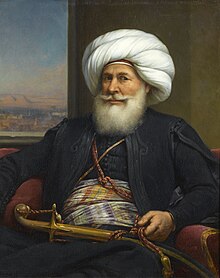Muhammad Ali of Egypt
Appearance

Muhammad Ali (4 March 1769 – 2 August 1849) was the Ottoman Albanian governor and de facto ruler of Egypt from 1805 to 1848, considered the founder of modern Egypt. At the height of his rule, he controlled Egypt, Sudan, Hejaz, Najd, the Levant, Cyprus and parts of Greece.
| This article about a monarch is a stub. You can help out with Wikiquote by expanding it! |
Quotes about Muhammad Ali
[edit]- The role of these historical events, rather than cultural factors, in shaping the Middle East’s economic trajectory is also seen in the fact that the parts of the Middle East that temporarily broke away from the hold of the Ottoman Empire and the European powers, such as Egypt between 1805 and 1848 under Muhammad Ali, could embark on a path of rapid economic change. Muhammad Ali usurped power following the withdrawal of the French forces that had occupied Egypt under Napoleon Bonaparte. Exploiting the weakness of the Ottoman hold over the Egyptian territory at the time, he was able to found his own dynasty, which would, in one form or another, rule until the Egyptian Revolution under Nasser in 1952. Muhammad Ali’s reforms, though coercive, did bring growth to Egypt as the state bureaucracy, the army, and the tax system were modernized and there was growth in agriculture and industry. Nevertheless, this process of modernization and growth came to an end after Ali’s death, as Egypt fell under European influence.
- Daron Acemoglu and James A. Robinson, Why Nations Fail: The Origins of Power, Prosperity, and Poverty. Crown. 20 March 2012. p. 61. ISBN 978-0-307-71923-2.
- It is particularly instructive to turn to the example of Egypt under Mohammed Ali, who ruled from 1805 to 1849. [...] The ideals of Mohammed Ali could be related in the idiom of modern social science as being the creation of a viable, self-propelling economy to provide the basis for national independence. Such ideals were diametrically opposed to the needs of European capitalism. British and French industrialists wanted to see Egypt not as a textile manufacturer but as a producer of raw cotton for export, and an importer of European manufactures. European financiers wanted Egypt to be a source of investment, and in the second half of the eighteenth century they turned the sultan of Egypt into an international beggar, who mortgaged the whole of Egypt to international monopoly financiers. Finally, European statesmen wanted Egyptian soil to serve as a base for exploiting India and Arabia. Therefore, the Suez Canal was dug out of Egyptian soil by Egyptians, but it was owned by Britain and France, who then extended political domination over Egypt and Sudan.
- Walter Rodney, How Europe Underdeveloped Africa. Howard University Press. 1972. p. 153. ISBN 978-0-9501546-4-0.
External links
[edit]- Al Ahram special on Muhammad Ali
- Biographic Sketch of Mohammad Ali, Pacha of Egypt, Syria, and Arabia


